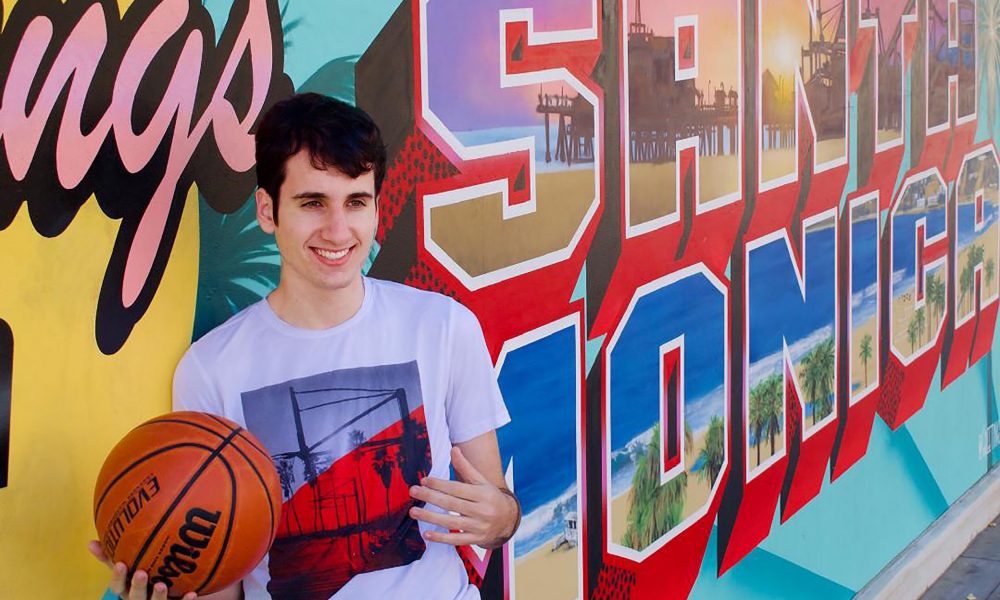

Today we’d like to introduce you to Keegan Fleigner.
Hi Keegan, thanks for joining us today. We’d love for you to start by introducing yourself.
I was born in Santa Monica in 2003. While in first grade, I was diagnosed as being on the autism spectrum. Shortly thereafter, my parents considered the possibility that team sports could help me in building my comfort and skill level in interacting with my peers through the structure that sports provided. As a result, starting at a young age I have undertaken a journey into sports that has fundamentally changed my life.
After playing and having a lot of success on my high school and YMCA sports teams in basketball, volleyball, and track, I decided to share my story through a podcast I started last year called “Sports on the Spectrum.”
Alright, so let’s dig a little deeper into the story – has it been an easy path overall and if not, what were the challenges you’ve had to overcome?
When I was in elementary school, the obstacles and challenges were very real for me. I always did really well in my classes, but it was hard for me to make eye contact, even with people I knew well. I also had sensory integration challenges, which meant that I sometimes had to adjust my physical behavior to feel comfortable in my own skin, such as spinning a lot while standing in place. I also needed lots of quiet “alone time” to calm myself after being in normal situations that felt very “loud” and active to me.
As a result, it was sometimes hard to make a lot of friends. I didn’t mind so much because I was often more comfortable being quiet and alone, but as I got older I gradually realized how important it was to figure out how to make and keep friends. Team sports was a great way to accomplish this because it provided me with lots of opportunities to talk to other kids about stuff I liked to talk about.
We’ve been impressed with Sports on the Spectrum, but for folks who might not be as familiar, what can you share with them about what you do and what sets you apart from others?
I started “Sports on the Spectrum” to provide a forum for athletes and coaches with social, emotional and/or developmental health conditions (like Autism, ADHD, Bi-Polarity, Depression, etc.) where sports has been life-changing in addressing or assisting these types of conditions. I want to connect with and help others who also have conditions that aren’t well understood and who share my love of playing and/or coaching sports to talk about experiences on and off the playing field.
I created “Sports on the Spectrum” not only to tell my story but to share our stories. It’s my hope that together we can encourage more people with these conditions to try sports! And that perhaps we can help others to better understand all of the great things that people with Autism, ADHD, Depression, etc. can do – including playing or coaching sports.
I’m a high school senior, so this podcast is a hobby — not a career (yet.) But it’s been a lot of fun and I feel like I’m doing my part to give back to society and help others, just like I was helped by lots of coaches and teammates when I was younger.
What has been the most important lesson you’ve learned along your journey?
I have learned a lot of life lessons through sports and the podcast. One of the biggest is to not let failure, inexperience, or a lack of natural talent deter anyone from still being able to try different sports and get better at them. Joining teams allowed me to utilize approaches for tackling the more difficult aspects of sports, which are to not make excuses when I mess up and to realize that sports in its simpler aspects become a whole lot easier to process, such as how any pain I feel in a race will last only a few minutes longer.
Another lesson I have learned has been to turn my autism from a “negative” into a positive. In fact, there are many positive aspects associated with being autistic. Perhaps the biggest is that I never worry about what other people might be thinking about me, so I don’t waste time on that and just focus on being me. I’m also really good at taking directions and being able to incorporate them almost immediately (in sports — this is called being very “coachable” and is really valuable in team sports.)
Also, through the podcast, I have learned there are a lot of people out who have their own challenges which might not be exactly like mine, but they’re similar enough that I understand them and try to apply lessons learned from one situation to another. So I’m not alone and I hope that young people listening to or watching my podcast will realize they’re not alone either.
Contact Info:
- Email: [email protected]
- Website: www.sportsonthespectrum.net
- Instagram: SportsontheSpectrum
- Facebook: https://www.facebook.com/SportsontheSpectrum/?notif_id=1629271488362846¬if_t=page_user_activity&ref=notif
- Twitter: https://twitter.com/SportsontheSpe2
- Youtube: https://www.youtube.com/channel/UCLHlXQn7zxg5YWFPTdESM-g











Image Credits:
Photos by Cherie Detwiler & Jim Fleigner












JOHN J. FLEIGNER
September 10, 2021 at 09:01
IT’S 4 AM AND HERE I AM ONCE MORE BEING AMAZED AT MY GRANDSON—YOU ARE THE BEST—THE THINGS THAT YOU HAVE DONE IN YOUR SHORT 18
YEARS ARE ASTOUNDING—GRANDMA AND I ARE VERY PROUD OF YOU AS A GRANDSON BUT MORE SO AS A EXAMPLE OF WHAT THE FUTUTE OF THE YOUTH
IN AMERICA CAN BE—LOVE YOUR FAMILY—GRANDPA